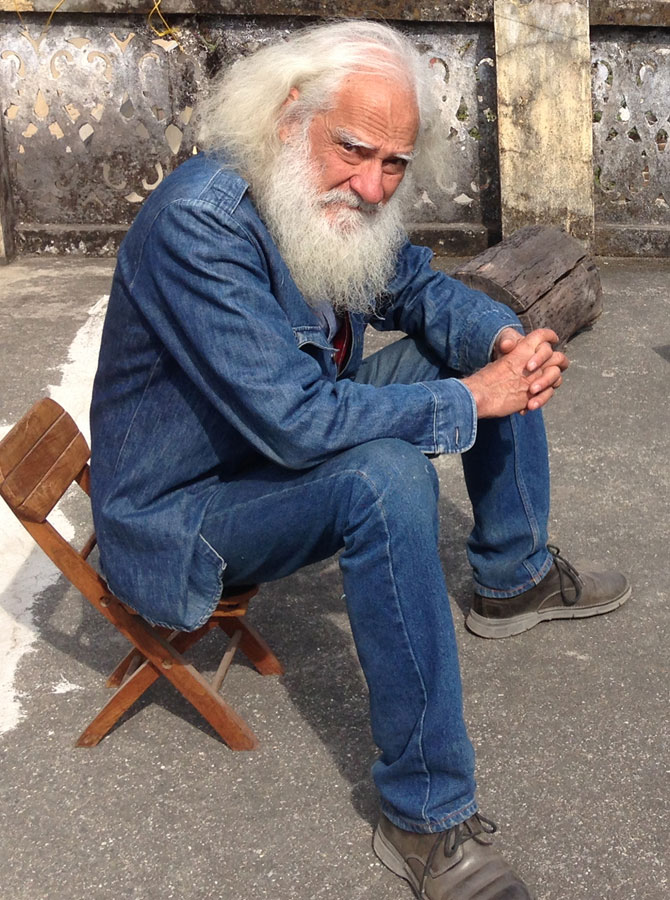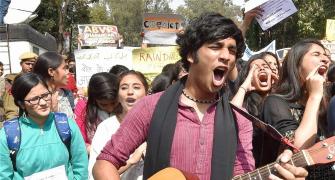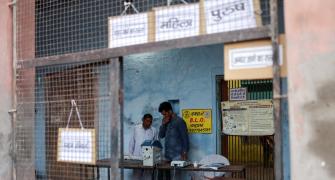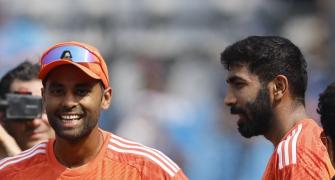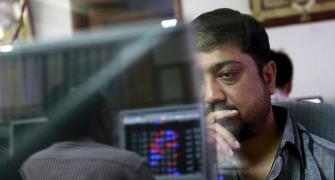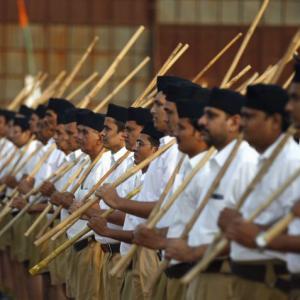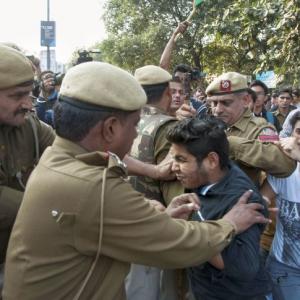'It is strange that people who dissent get computer-generated I-T notices.'
'We want people to break their silence; keeping silent amounts to tacit consent.'
'Public dissent is the highest public duty and I will continue to speak out.'
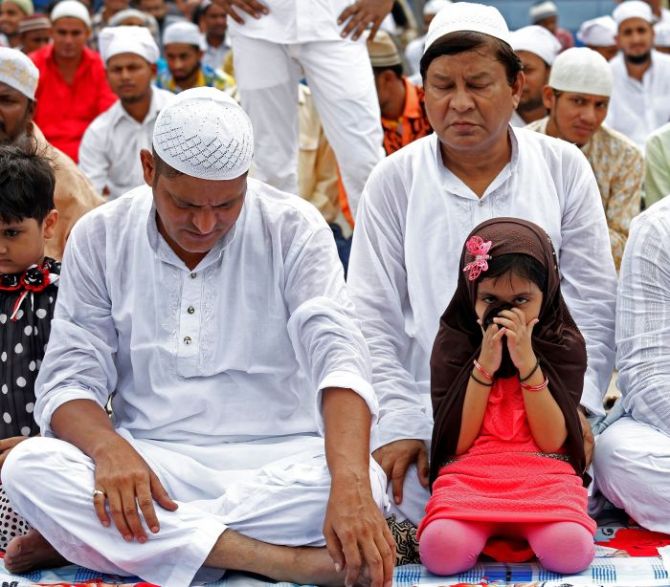
The Centre for Equity Studies, run by former IAS officer Harsh Mander, has been served an income tax notice for 'complete scrutiny' of its returns.
The institute received a notice under Section 143 (2) of the Income Tax Act for scrutiny of its I-T returns for the assessment year 2016-17 on September 20.
Mander is currently visiting various states where lynchings have taken place in recent months as part of the initiative, Karwan-e-Mohabbat or the caravan of love -- which he has described as a journey of love, atonement and solidarity.
Mander took to Twitter to state that there was a link between the I-T notice and his run-in with Rashtriya Swayamsevak Sangh ideologue Rakesh Sinha on national TV recently.
Mander speak to Rediff.com’s Syed Firdaus Ashraf about his yatra and the income tax notice.
What was your first reaction when you received the income tax notice?
We had received many notices and never been concerned about it. We have always cooperated with the government on income tax notices. It is just the timing of the notices and the way it transpired that caused me to express my concern.
On national television, he (Dr Rakesh Sinha, RSS ideologue) said that I am an RSS hater to which I responded that I am passionately opposed to RSS ideology. I believe that the idea of a Hindu rashtra goes against the Constitution of India. We must guarantee, in every respect, equal rights for minorities and other weaker section of society.
He then said that we must have a detailed inquiry of the funding of my organisation. I don’t own any organisation and, four days later, I got this income tax notice.
I feel public dissent is the highest public duty and I will continue to speak out.
Dr Sinha has denied his role or that of the RSS in you being served an income tax notice. Moreover, income tax notices are computer generated.
I am not blaming anyone. How do I know whether it is computer generated? It is sort of strange that people who dissent against the government get computer generated income tax notices.
Do you feel the government is afraid of your Karwan-e-Mohabbat as it is gaining popularity?
It has unnerved the government. At many places, people were pressured to cancel our programme.
What were we trying to do? We were trying to express solidarity for the victims of the lynchings and also with the community which senses a fear.
I believe it is the duty of the prime minister of India and chief ministers of different states to go and meet the families of the victims of lynchings. We also wanted to inform the country and the majority public opinion that these are not stray incidents; there is a pattern running across the country.
There are similar forms of attacks and a similar attitude among the police, who are criminalising victims rather than protecting them.
Lynchings happen because there is an environment which is permissive and supportive of this kind of violence.
We found a similar pattern from Jharkhand to Karnataka, from Haryana to Western Uttar Pradesh, from Rajasthan to Gujarat.
Also, we are trying to make a call for public conscience. We want people to break their silence; keeping silent amounts to tacit consent to what is happening in the country and they need to speak out.
How many states have you travelled to so far?
Assam, Jharkhand, Karnataka, Delhi, Western UP, Haryana, Rajasthan and Gujarat.
We met the families of those who have been lynched or have been victims of hate attack. There is a huge response from the families for our caravan and also from minorities and Dalit communities.
At the local level, I was saddened to find much less remorse where the violence happened. That is a matter of deep concern.
Why do you think there is no remorse among the locals for the lynchings?
We have created an environment which is permissive of hate that victimises the hatred against minorities and disadvantaged castes. We need to fight against this.
Gopal Krishna Gandhi wrote in an article recently that there was one partition on the land of the country. This time, there is a partition of the hearts and minds of the people. It is in this context that we need to fight the battle of the hearts and minds. This is why we are going with our caravan.
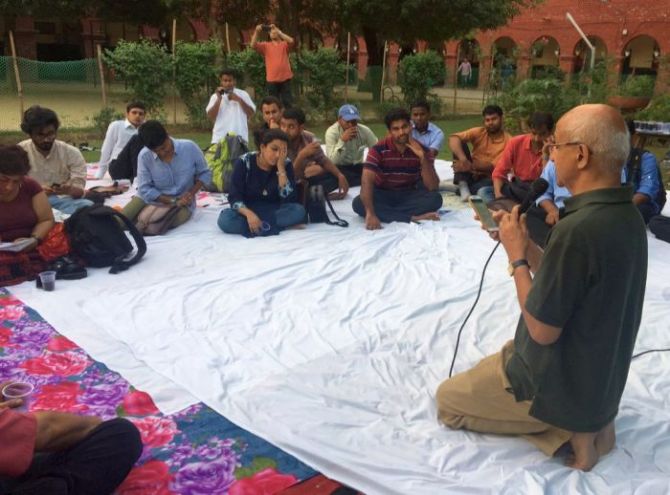
How many people have been killed in these lynchings?
We are visiting two or three families per state. There are 50 families that we met who are affected not by lynching alone but also by anti-Dalit atrocities.
There are four kinds of violence. Lynching, atrocities on Dalits, the attacks on women as witches which predates the present government and the fourth attack is increasing in places like Western Uttar Pradesh and Haryana by the police itself on minorities in large numbers.
Aren't you frightened to visit such places where your life could also be in danger?
There is a lot of hostility. The actual attack happened at the place where Pehlu Khan was lynched. The Hindu Jagran Manch, Vishwa Hindu Parishad and Bajrang Dal told us that they will not allow us (in the area) under any circumstances. The police and administration too told us we must not go.
I could not understand why they did that. At that place, mobs were throwing stones at our bus. The police too were not agreeing, so we sat on a dharna. The danger is always there, but we felt it is more important to visit these places.
Did Bajrang Dal or VHP guys threaten you anytime personally?
They gathered and threw stones. At some places, people had assembled with flowers and banners for us, but they pulled down the banners that were welcoming us. This happened at two places in Rajasthan. After that, the government told us we cannot go further without police protection.
It was ironic that the caravan for love and peace could not move without police protection.
Is lynching a new phenomenon in India? Because, as far as I recall, it was always there in India. What has changed now?
The scale and pervasiveness of it has changed. IndiaSpend did a quick survey and they found out that there was a jump of 97 per cent of lynching attacks after Modi became prime minister.
I think we have to build a society where we do not debate about who is a Hindu or a Muslim. Let us care for each other as human beings independent of our identity of community, religion, caste or gender
It happened because there is an environment which is permissive and supportive of this kind of violence. We always find that the political leadership -- state home ministers and legislatures all support the accused. There is an attempt to protect the accused.
Gau rakshaks are seen as righteously angered and cases are registered against the people who have been attacked. In almost every case, there is an attempt to protect the accused.
An environment has been created so that this becomes pervasive. There is a very important difference between communal violence and lynching.
Communal violence is bound by a geographical space and by time. It is a much larger attack but it gets over and things come back to normal.
In lynchings, the message is that anyone anywhere can be targeted. No one is safe if you belong to the targeted community.
I have encountered this especially with people from the Muslim community. There is a sense of fear in them across the country in various social classes because of this successful strategy.
Therefore, it was important for us to take out the caravan of solidarity.
Do you feel someone who is visibly a Muslim is scared to move around today?
Yes, he is absolutely scared. I think this is what former Vice President Hamid Ansari too said. I had encountered this before my caravan but, after the caravan, this picture has become clearer to all of us.
There is a pervasive sense of fear in Muslims who look like Muslims in the public space.
I spoke to an RSS ideologue recently and he told me there was no fear among Muslims as they are going about freely on the streets of India. It is only the secular brigade that wants to put this fear in their minds.
What do you have to say about that?
Our caravan has evidenced enough which is contrary. It is not me but there are many who joined the caravan who will tell the country that this is not true. There is a great sense of fear among Muslims in India. It is everyday fear.
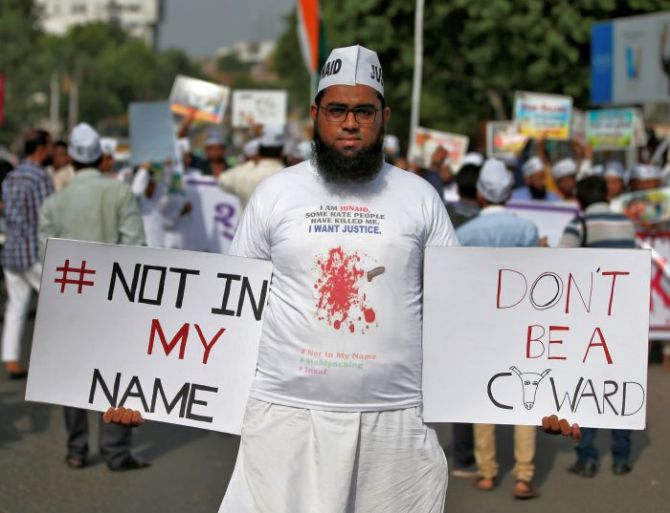
Your critics say you do not take out yatras when RSS leaders get killed in Kerala or in Karnataka? Why is this outrage selective against Hindus?
When we say Hindu suffering and Muslim suffering, I see it as a huge problem. The IndiaSpend data proves that 86 per cent of people killed in lynch attacks are Muslims, eight per cent are Dalits. That makes 94 per cent. The remaining six per cent are mainly identities unknown.
We are going by these figures which are mainly Muslims.
As far as the cycle of political violence between the Communist Party of India-Marxist and RSS workers in Kerala, I am completely opposed to violence. I have complete sympathy for both CPI-M and RSS workers.
What do you want to achieve with this caravan and what message do you want to send across?
Our Constitution says four words. Justice, Liberty, Equality and Fraternity. Most of us do not understand what fraternity means and how important it is for our democracy.
Dr Babasaheb Ambedkar said fraternity is the foundation of democracy. Fraternity is the idea that we belong to each other. That is why when Junaid was killed I wrote an article, Junaid was my son.
I think we have to build a society where we do not debate about who is a Hindu or a Muslim. Let us care for each other as human beings independent of our identity of community, religion, caste or gender.
That is what I call love. Love is courage. Gandhiji in the last month of his life saw a million people die in Hindu-Muslim riots but he still spoke about love and a country based on Hindu-Muslim unity.
It is that kind of love which comes out of great courage that we have to strive for.

